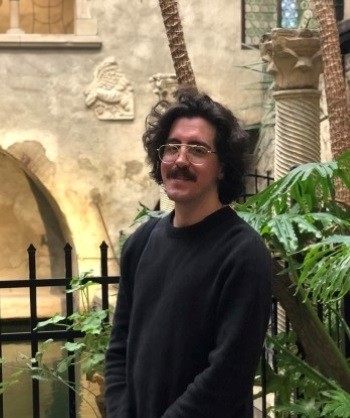


Stokes Hall South 316
Email: dalisera@bc.edu
ORCID 0000-0001-7913-6944
caves and stone in premodern Britain; early medieval ritual and religion; Old English literature; Pictish stones; North Sea environmental history; the history of the museum; digital humanities
Alexander D’Alisera is an environmental historian of premodern Europe, focusing on caves, stone, ritual, and religion in the early medieval North Sea milieu. He is currently the 2024-25 Charles W. Maus Graduate Research Fellow in Karst Studies at the Cave Conservancy Foundation. His dissertation, planned for completion in 2025, is entitled “Real and Imagined Caves in Early Medieval Britain, c. 400-1000 CE.” In this project, he applies an eco-critical lens to archaeological and literary sources in order to explore cave use and underground meaning in post-Roman and early medieval Britain.
D’Alisera’s newest article, in press with postmedieval, is entitled “Speluncar Slumber and the Medieval Time Traveler: Unearthing the Imagined Cave of the Old English Seven Sleepers.” His chapter on the Book of Durrow’s iconographic resonances with Pictish stonescapes is also forthcoming, in Ì Chaluim Chille: Interdisciplinary Studies on Iona and Columba. In 2023, he was first author on a new translation of and introduction to “The Dream of the Rood,” which appeared in the third volume of Tony Burke’s New Testament Apocrypha book series. With colleagues from Queen’s University Belfast and Durham University, he is co-editing an international volume, provisionally titled Interdisciplinary Perspectives on Stone and Society from Prehistory to the Middle Ages. At Harvard University, he has advised and evaluated senior theses in the Department of the History of Science since 2023.
D’Alisera previously attended Yale University as a Marquand Scholar, where he received an M.A. in religion from the Divinity School. He also holds a B.A. in history and classics from Bard College, where he attended as an Excellence and Equal Cost Scholar. From Boston College, he holds a graduate certificate in digital humanities. His current CV may be downloaded from his Humanities Commons profile: https://hcommons.org/members/dalisera/.
“Speluncar Slumber and the Medieval Time Traveler: Unearthing the Imagined Cave of the Old English Seven Sleepers,” postmedieval, forthcoming.
“Durrow’s Lion: Irenaeus, Pictish Stonescapes, and the Book of Durrow’s Non-Hieronymian Evangelical Symbols,” in Ì Chaluim Chille: Interdisciplinary Studies on Iona and Columba on the 1500th Anniversary of the Birth of the Saint, ed. Sofia Evemalm-Graham (Clò Gàidhlig Oilthigh Ghlaschu, 2024), in press.
“The Dream of the Rood: A New Translation and Introduction,” in New Testament Apocrypha: More Noncanonical Scriptures, vol. 3, ed. Tony Burke (Eerdmans, 2023), 110-129 (with Samuel Osborn).
Review of David Ceri Jones et al., A History of Christianity in Wales (University of Wales, 2022), in Reading Religion 8, no. 9 (American Academy of Religion, 2023).
Translation of Beowulf, lines 151-165, in Beowulf by All, ed. Jean Abbott, Elaine Treharne, and Mateusz Fafinski (Arc Humanities, 2021).
Review of Jordan Zweck, Epistolary Acts: Anglo-Saxon Letters and Early English Media (University of Toronto, 2018), in Reading Religion 5, no. 7 (American Academy of Religion, July 2020).
Translation of “Catullus V and VII,” in Sui Generis (Bard College, Spring 2014), 66-69.